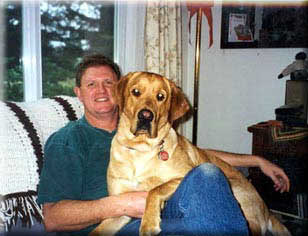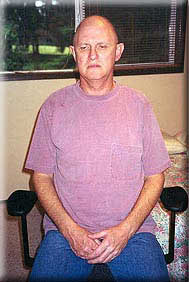Best Treatment Path in Imperfect World
Mike Abbott makes tough decisions every day. He’s an Environmental Manager who investigates and manages the clean-up of toxic waste sites. He knows that when dealing with abandoned chemical waste, slurries and sludge, the risk of catastrophic failure runs high, and thus there is no room for failure. He approaches his job with care, precision and a healthy thirst for the facts.
Mike was about to be promoted to Project Manager of a large EPA Superfund Site in Oregon when he was diagnosed with malignant mesothelioma in November. At the time of this writing, Mike and his wife Marcia are preparing to fly to Detroit, Michigan where Dr. Harvey Pass has scheduled Mike for surgery.
While his local doctors spent almost a year trying to diagnosis his health problem, Mike came to several realizations. One of the most important was that this was serious, his own life was at stake. He also realized that he could not do it alone. He would have to trust somebody. In the end, he decided to trust himself and his wife to find the best doctors -- those who could offer him the best hope of a cure. This is Mike's story.
Christmas Eve, 1999
On Christmas Eve in 1999, Mike was having severe chest pain, back pain and shortness of breath that prompted him to rush to the emergency room at Providence Hospital in Portland, Oregon. The emergency room doctors ruled out most of the immediate life threatening problems, except for pulmonary embolism. A nuclear scan of his lungs and other tests were performed, which the doctors interpreted as negative for an embolism or blood clot. Mike was released and referred to his primary care physician.
On January 27, 2000, Mike met with his local doctor. A blood test was taken for inflammation of the lining of the heart and an EKG was performed. His doctor diagnosed pleurisy and prescribed an anti-inflammatory drug. Mike later complained to his doctor because the anti-inflammatory was upsetting his stomach. When he continued to experience chest pain, his doctor changed his anti-inflammatory drug and referred him to a pulmonologist.

The pulmonologist was unable to rule out a pulmonary embolism, so Mike was admitted to the hospital for more blood work, asthma challenge testing in addition to an echocardiogram, and a pulmonary angiogram. A pulmonary embolism was again ruled out, and the pulmonologist suspected possible asthma and rheumatism. Mike was referred to a rheumatologist.
A New Doctor, A New Round of Tests
The tests continued, and Mike’s doctors continued to rule out possible diseases. The blood tests for rheumatism and lupus were negative. Mike began taking Vioxx, an anti-inflammatory, which helped to control his pain, but not the shortness of breath. Because Vioxx upset his stomach, Mike also took Prilosec. Meanwhile, his chest pain intensified and he was forced to make another emergency room visit. This time, he was diagnosed with mild pleurisy and arthritis. The doctors recommended physical therapy. Mike was skeptical of physical therapy, but finally attended one session where the physical therapist told him he was being treated for pain from inactivity or from his previous back injury. Mike knew this didn’t make sense and he began to seriously question the wisdom of his doctors. He wasn’t sure what to do.
Upper Abdominal Pains
Mike was accustomed to "listening" to his body, and he knew something was wrong. He began to feel pain in the upper left abdomen. His doctors dismissed the symptom as inconsequential. Eventually, Mike returned to his local family doctor, and at Mike’s urging, the doctor ordered a CT scan of the upper abdomen, a chest film and more blood tests.
The results were foreboding. The CT scan and chest film revealed a small pleural effusion in his left lung. Looking back, this was the quintessential "red flag." However, his pulmonary doctor continued to concentrate on a possible underlying bacterial condition and prescribed antibiotics. The Vioxx meanwhile may have been controlling the pain associated with deep breathing by reducing the inflammation of the pleural membranes.

The pulmonary doctor was also reluctant to "tap" or drain the effusion because of the small volume, citing concerns about puncturing the lung. Eventually, he did perform the procedure -- a day which will live in infamy for Mike as it took three stabs with the needle to finally withdraw 100 cc of fluid, a trauma that nearly caused Mike to pass out. Mike was not advised of any suspicions raised by the cytology, but was advised simply advised that the results were "not diagnostic." Translation: Mike needed more tests.
Video Assisted Thoracic Surgery to Obtain Biopsy
The pleurodesis served as a medical "wake up call." His lung specialist’s attitude seemed to change from detached to gravely concerned after this test. Although the doctor disclosed that the test results were "inconclusive," he immediately ordered a biopsy. Mike began to suspect that something was seriously wrong. Perhaps he had cancer. He learned later that the cytology analysis did suggest the possibility of mesothelioma or adenocarcinoma.
On November 2, 2000, Dr. Handy, a thoracic surgeon in Portland, performed video-assisted thoracic surgery (VATS) to obtain tissue specimens. The specimens, which did include a lymph node dissection, were sent to a pathologist who returned the diagnosis of epithelial malignant mesothelioma.
Just after Mike regained consciousness from the surgery, Dr. Handy informed Mike that he had asbestos-related cancer. Mike understood he had cancer, but had never heard the word "mesothelioma" before. The next question was staging; since no lymph nodes were biopsied, the doctors attempted later to obtain a lymph node using a needle. However, this was not successful. An ultrasound indicated two enlarged lymph glands.
Portland Surgeon Recommends Dr. Vallieres
Dr. Handy referred Mike to Dr. Eric Vallieres at the University of Washington. Dr. Vallieres is well known in the Pacific Northwest for treating his patients with a tri-modal therapy. Tri-modal therapy consists of pre-surgery chemotherapy, followed by extra pleural pneumonectomy (only if the tumor shows a response to the chemotherapy), followed by radiation therapy . Dr. Valliere’s protocol uses a chemotherapy cocktail of cisplatin, methotrexate and vinblastine . He reports a response rate of approximately 52%.
At first, Mike decided to meet with a local oncologist, Dr. John W. Smith. Dr. Smith recommended chemotherapy treatment using a combination that most oncologists nationwide were using for mesothelioma -- Gemzar and cisplatin. On November 20, Mike received his first round of Gemzar and cisplatin, and that night he became violently ill. He returned to the oncologists office in the morning of November 22, for intravenous fluids. On November 27, Mike returned for his second dose of Gemzar, and on December 4, for his third Gemzar dose. The oncologist canceled the treatment, however, because of Mike’s low platelet and white blood cell counts.
On November 28, Mike’s illness was exacerbated by rectal pains, which were diagnosed as possible stomach and rectal ulcers. His breathing became shallower and labored. His resting pulse rate increased to 100 BPM. A second thoracentesis was performed on December 13th, but less that a tablespoon of fluid was recovered, and his symptoms continued unabated. Prednisone was finally given to relieve the worst of his symptoms.

Second Cycle of Chemotherapy Canceled
Dr. Smith ordered a CT scan on December 15th, which showed that the tumor had not been reduced. If anything, it appeared to have grown. Dr. Smith called Mike and canceled the second cycle of chemotherapy.
Mike eventually met with Dr. Vallieres in Seattle in late December. Dr. Vallieres recommended two cycles of chemotherapy, at the conclusion of which a CT would be taken to find out whether the tumor had responded. Dr. Vallieres does not automatically intervene surgically on all his pleural mesothelioma patients. In his experience, if the tumor does not show a response after two full cycles of chemotherapy, then surgery may not be a viable option. Consequently, a patient’s eligibility for tri-modal therapy is contingent on his first showing improvement with chemotherapy alone.
Mike’s concern was whether he would be able to switch to another treatment plan if it turned out that the chemotherapy prescribed by Dr. Vallieres was not working. He also worried about the risk of he cancer continuing to progess during chemotherapy. He understood that long term survivors have to be flexible and ready to jump from one plan to another if the need arises. Dr. Vallieres, however, did not offer Mike a back-up plan that involved other treatment protocols.
Although it had been several months since the tumor was symptomatic, Mike decided to keep searching.
Internet Search Yields Dr. Perez-Solar, Dr. Pass, Dr. Rusch, et al
Mike contacted a number of prominent surgeons, including Dr. Perez-Solar, Dr. Pass and Dr. Rusch. Platar stimulated Mike’s interest, so he called Dr. Perez-Solar in New York. He learned that he would need a free flowing pleural effusion to be considered for this treatment option. Mike was not eligible. Moreover, with time slipping away, Mike was disappointed to hear from the medical staff that he would need a direct referral from his own doctor to Dr. Perez-Solar.
He next contacted Dr. Rusch, also in New York , as well as MD Anderson in Houston and UCLA Medical School in Los Angeles. He learned the hard way how difficult it is to get reliable information from credible sources on a disease so confounding and rare.
Dr. Pass "Answers his own phone."
Finally, Mike called Dr. Harvey Pass in Detroit. Dr. Pass picked up the telephone himself and without fussing over formalities, dove right into the core diagnostic, staging and treatment issues. Mike arranged to mail his records and CT scans to Dr. Pass. Mike was pleased to get the attention of a prominent surgeon who was loathe to delegate critical tasks to subordinates. Mike was impressed with his take-charge attitude, breadth of knowledge, flexibility and credentials.
"You have to trust somebody," Mike explains. "I suppose I’m somewhat skeptical by nature, but I have every reason to trust Dr. Pass’ judgment." Mike decided to seek treatment from Dr. Pass in Detroit. The plan is for Mike to undergo exploratory surgery on February 5th, during which Dr. Pass will "take a look under the hood" and determine what portion of the tumor can be removed. After recovering from the surgery, Mike will be included in a special investigation conducted by Dr. Pass using copper chelate.
Copper chelate is taken orally in pill form. The theory is that the drug will decrease the availability of copper in the body, which tumors need to form new blood vessels. Dr. Pass theorizes that if you reduce the body’s copper levels, new vessels cannot form in the tumor. He hopes this will retard tumor growth or eradicate growth altogether. A simple blood test will allow Dr. Pass to monitor the copper levels in the body, so patients can return home after the surgery.
Dr. Pass is in the process of obtaining a large grant from the NCI to manage a nationwide trial using copper chelate. In the meantime, Dr. Pass will provide the drug to Mike. If all goes well, Mike hopes to return to work within six weeks after surgery.
Rolling the Dice
Mike has poured over the response rates and survival statistics for mesothelioma -- a task that can easily bring the strongest man down. He understands that statistics apply to groups of patients and he doesn’t take them personally. "There is no statistic that says Mike Abbott has to die from this. I’m early stage, epithelial, young, healthy, hopeful, and I love my wife dearly."
Add "intelligent" to the list. After a slow start, Mike has now learned to assert himself, and take some measure of control over his outcome.
"I know with mesothelioma there is a certain amount of ‘rolling the dice.’ But now, " says Mike, after choosing Dr. Pass, "I feel like at least I’m rolling the dice, not the doctors." Mike has learned the hard way in the mesothelioma treatment world, in the face of a tumor that is nearly impervious to the "chemo of the day," success seems to be the anomaly. At least with Dr. Pass’ approach, Mike believes he has a chance for a home run, a medical breakthrough.
Mike explained his reasoning as follows:
"The reason I chose Dr. Pass is complex. First I have come to believe that surgery first offers the most hope for someone with stage I epithelial mesothelioma.
Second, Dr Pass has the reputation and status as a surgeon and as a leader in the fight against mesothelioma. He was also the most accessible of all the leading doctors in the field I tried to contact. I also have lost my belief in the current chemo-therapy and radiation therapy as treatments for mesothelioma. Research of the numbers was not encouraging especially after I had disease progression during the first round of chemo. I also looked at the quality of life issues surrounding the chemo and radiation therapies. I am unwilling to spend six to eight months of my life being deathly ill with minimal hope of benefit.
Having lost faith in chemo and radiation therapies I needed a systemic treatment to add to the surgery. The copper chelate trial fits that bill. I know it may not work but at least there is the chance of spectacular success which cannot be said for anything else being used to date. I can also try other therapies if the copper chelate therapy fails. I am excited about the future intra-pleural Platar treatments but found several reasons why it would not be best for me.
Ultimately, I made the choice rather than having it made for me."
*** POSTED FEBRUARY 1, 2001 ***
An Update -- 9/25/01
The past few months have proven difficult for Mike. As of a month ago, he had lost 40 more pounds, and he now weighs less than 150 pounds. He has required care at a hospital twice this month, and no longer goes to Providence Hospital, preferring instead to seek treatment at Southwest Washington Medical Center.
Exploratory surgery showed that his mesothelioma had spread to his stomach; as a result, his stomach is no longer functioning.
Currently, he is at home, under the care of Southwest Washington Hospice Service, as he maintains hope and tries to determine the next best course of treatment.
Mr. Abbott passed away on November 17, 2001


